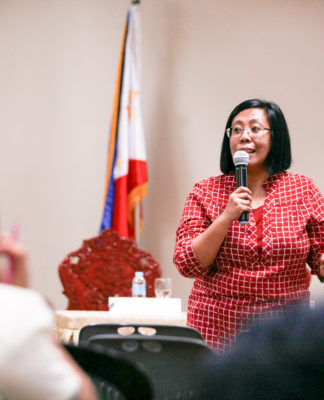 ONCE, we we’re an obedient, disciplined, wealthy-looking nation. There were no slums in sight when you drive by the boulevards, we didn’t carry guns around, we hurry for home and clear the streets by twelve o’ clock, and seldom do we hear complaints about our government—if there were, it was, in a way, short-lived.
ONCE, we we’re an obedient, disciplined, wealthy-looking nation. There were no slums in sight when you drive by the boulevards, we didn’t carry guns around, we hurry for home and clear the streets by twelve o’ clock, and seldom do we hear complaints about our government—if there were, it was, in a way, short-lived.
It was a quiet time in the Philippines, the people who lived through Ferdinand Marcos’ regime says. But not the comfortable silence you have when you’re at peace. It’s a stillness you strive to make when you want caution; a brand of silence generated by fear.
Fear is an essential tool for leadership. It’s the easiest and most effective way to make people follow. As Niccolò Machiavelli wrote in his book, The Prince “Commitments made in peace are not always kept in adversity; however, commitments made in fear are kept out of fear.” And history ascertains that it is the virtue of “inhuman cruelty” or at least the fear of it that makes the people instantly adhere to their leader’s will.
It was during a thesis consultation session when I had my own awakening dose of fear. I came in more than a few minutes later than the time agreed upon. People are late; most of us have already accepted that. This was a belief of mine that have earned me a rejected paper and an effective threat of a singko.
My initial reaction was disdain, of course. But I came in thirty minutes earlier the next meeting and one of the first few lines that I heard was:
“Kung ‘di ba kayo takot, darating ba kayo on time?”
I answered a guilty ‘no’ to myself. And at that moment I figured out what my professor was trying to point out.
Fear or the concept of punishment and reward is the basic level of conscience; it’s the kind of discipline that is used to handle pre-schoolers so they would do their homework or sleep early. It is usually the first phase, but the concept of punishment and incentive has extended too far out in our lives.
Martial law was Marcos’ way of control. I don’t have the right to make any judgements regarding this because everything that I know about the era is only patched up from novels, films, and tell tale stories. But I am aware that this was one of the darkest times in the Philippine history and I am glad that it was over. But have we resented the entire idea that we chose to not to leave in our minds even an ounce of discipline?
Without fear, the police have become synonymous to extortionists if not, a joke which a couple of pesos (or a connection with someone up there) could manipulate.
There’s no curfew these days, but you can’t roam the streets without the fear of getting mugged—even in broad daylight.
We fought for our “democratic” status because we believe we know what is right and just and that we could do better without being driven by fear because we’re mature and responsible enough to enjoy this privilege.
And I hope that we’re right. Because at times I can’t help but be afraid to accept that this is what we call “freedom”.
***
The 27th Gawad Ustetika, the annual student awards for literature of the University of Santo Tomas, is open to all current Thomasian students with penchant for writing poetry, short story, essay, and one-act play, in English or Filipino.
For more information and entry forms, visit the Varsitarian office or call 406-1611 local 8235 or check Ustetika on Facebook (Varsitarian: 27th Ustetika).














